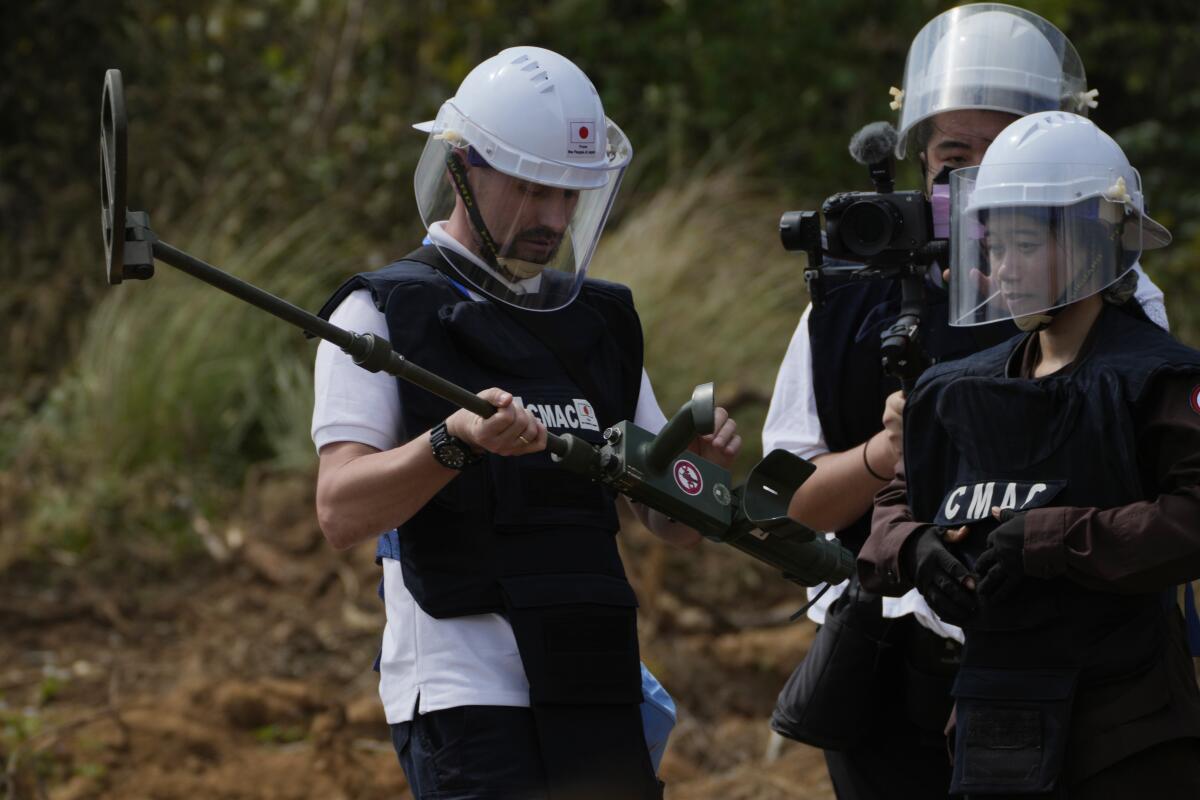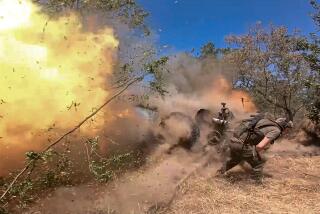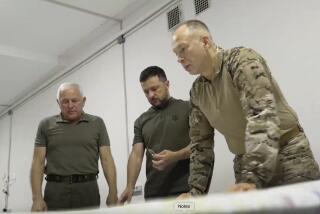Ukrainians learn mine-clearing skills from Cambodian experts

- Share via
PREYTOTOEUNG, Cambodia — Cambodian experts, whose country has the dubious distinction of being one of the world’s most contaminated by land mines, walked a group of Ukrainian soldiers through a minefield being cleared Thursday, hoping their decades of experience would help the Europeans in their own efforts to remove Russian mines at home.
Wearing protective body armor, helmets and visors, the group of 15 Ukrainians was guided along cleared routes through the former battlefield in the northwestern province of Battambang by trainers with the Cambodian Mine Action Center, a government agency that oversees the clearing of land mines and unexploded ordnance in the country.
Capt. Arsenii Diadchenko, who led the Ukrainian team, said that the training has been “quick and fast” but that they were learning good lessons.
“It will be very helpful in clearing our area of Russian mines,” he told reporters on the sidelines of the exercise.
Cambodia is still littered with mines after three decades of war and internal conflicts that ended in 1998, with an estimated 4 million to 6 million unexploded devices still uncleared. The Landmine Monitor in its 2022 report listed Cambodia and Ukraine among the nine countries with massive mine contamination, meaning they had more than 38.6 square miles of uncleared fields.
In Cambodia’s case, there were more than 276 square miles of uncleared fields, while the nongovernmental organization has been unable to reliably verify the extent of the contamination in Ukraine.
Russia, after its invasion of Ukraine, and Myanmar are the only two states with documented new use of land mines in 2022, according to Landmine Monitor, while non-state armed groups have also been confirmed to be using them in at least five countries.
Ukraine is new to demining, but the problem has beset Cambodia for so long that it transcends generations.
Since the end of the fighting, some 20,000 people have been killed in Cambodia by mines and unexploded munitions, and about 45,000 injured. Thanks to the demining and educational efforts, however, the average annual death toll has dropped from several thousand to fewer than 100.
Cambodian deminers are among the world’s most experienced, and several thousand have been sent in the last decade under U.N. auspices to work in Africa and the Middle East.
Cambodian trainer Voeun Chhorvy, 23, has been clearing minefields for only a year, but learned her skills from her father, who was also a deminer.
The CMAC expert told reporters she was “proud that I can show what I have learned” to the Ukrainians.
“I’m happy that I could share my experience with them,” she said.
Japan’s Sato Motoyuki, a professor at Tohoku University who has been working on innovations with ground-penetrating radar, was also on hand to coach the Ukrainians on using the Advanced Landmine Imaging System he developed in his lab.
The handheld device consists of a metal detector with an integrated ground-penetrating radar that can help deminers detect and identify buried mines.
He said that the soil conditions in Ukraine and Cambodia are very different, but that he has not yet been able to organize travel to Ukraine to train deminers there, and that he hoped the Ukrainians would learn enough in Cambodia to be able to use the devices effectively at home.
“After they learn the very basic operation of ALIS, I think they also can think about how they can apply it in a Ukraine minefield,” he said.
The Ukrainian team arrived in Cambodia on Monday and has been receiving training all week from the Cambodian deminers in a program supported by the Japan International Cooperation Agency.
Cambodian Prime Minister Hun Sen pledged in a telephone conversation with Ukrainian President Volodymyr Zelensky in November to send Cambodian demining experts to help train their Ukrainian counterparts.
Hun Sen has said the Cambodian deminers will be sent to Poland, a staging ground for much assistance to Ukraine, but the number of deminers to be sent and their destination have not been finalized.
The offer came after Hun Sen, in an unusual move for a nation that usually aligns itself with Russia and China, condemned Moscow’s invasion of Ukraine, saying, “Cambodia is always against any country that invades another country.”
Cambodia was one of nearly 100 U.N. member countries that co-sponsored a resolution condemning Russia’s invasion.
Several other countries, including the United States and Germany, have already provided Ukraine with demining assistance.
After their training in Battambang, the Ukrainian team is to travel to Siem Reap province, home to Cambodia’s famous Angkor temples, and tour a museum dedicated to land mines and unexploded ordnance before they return home.
Rising reported from Bangkok.
More to Read
Sign up for Essential California
The most important California stories and recommendations in your inbox every morning.
You may occasionally receive promotional content from the Los Angeles Times.










